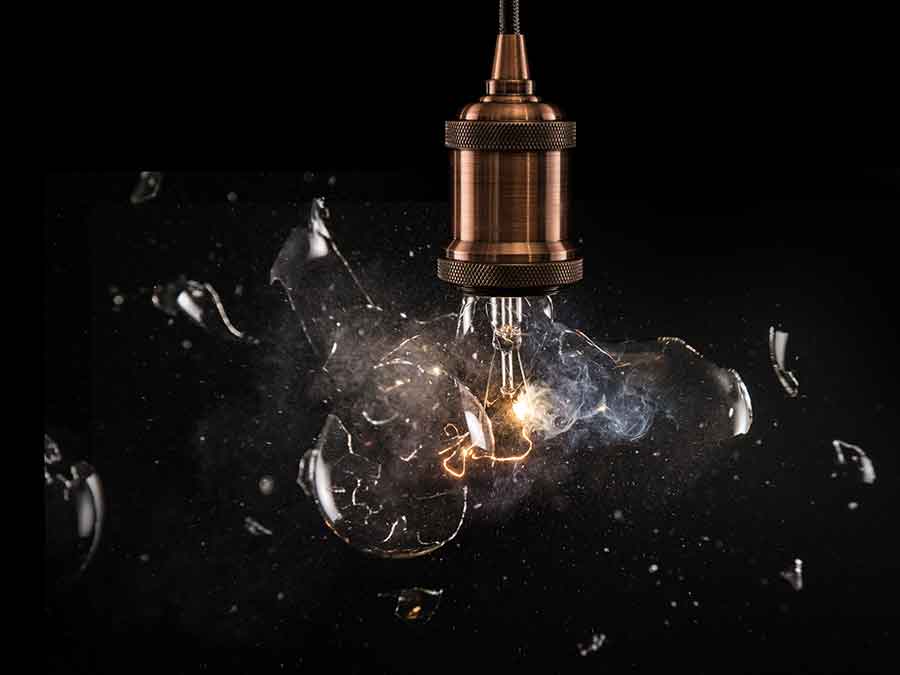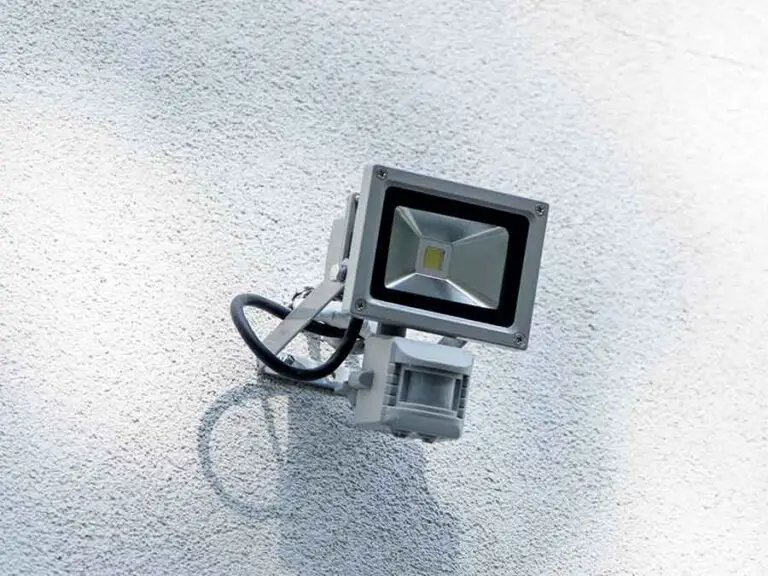What Causes a Lightbulb to Explode?
Few accidents are as shocking as an exploding lightbulb in your home. Bulbs can explode either upon flicking the light switch or at random while the bulb is lit, leaving you both startled and confused as to why it happened. In this article, we’ll go on to explain the causes behind an exploding lightbulb and how you can avoid these issues in the future.
Lightbulbs can explode under a few different circumstances, including the bulb having poor insulation, a loose or incorrect connection between the bulb and socket, a mismatch between the wattage of the bulb and fixture, or a power surge to the fixture. These are all common issues for conventional bulb types like incandescent, fluorescent, and halogen bulbs; and, although it happens rarely, it’s also possible for LED bulbs to explode under certain conditions.
Which Types of Lightbulbs Can Explode?
In theory, all types of lightbulbs can explode due to various faults within the bulbs. This includes incandescent, fluorescent, halogen, and LED bulbs, which all have the potential to explode. However, it’s extremely rare for this to happen with LED bulbs due to their components and mode of operation.

Can Incandescent Bulbs Explode?
Incandescent bulbs are one of the bulb types that are most likely to explode. These bulbs light up via a heated filament that glows when electricity flows through it. They are vacuum sealed and generate a lot of heat during operation. Due to these characteristics, there’s a lot of potential for incandescent bulbs to explode.
Can Fluorescent and Halogen Bulbs Explode?
Fluorescent and halogen bulbs are two more bulb types that are very susceptible to exploding. These bulbs work in a similar way to incandescent bulbs, but also involve gases that enhance their light. The gases are sealed within the bulb as a pressurized containment. This composition further adds to the potential for fluorescent and halogen bulbs to explode.
Can LED Bulbs Explode?
While LED bulbs can technically explode, it’s very unlikely for them to do so. LED bulbs work in a completely different way from the conventional types we’ve just described. They don’t involve any kind of gases, heated filaments, or vacuum seals; instead, LED bulbs light up using light-emitting diodes controlled by electrical components within the bulbs’ circuitry. LEDs generate little to no heat, leaving little potential for them to explode the way that conventional bulb types can. Still, in rare cases, LED bulbs can explode due to electrical faults that occur between the bulb and its fixture.
What Causes a Lightbulb to Explode?
1. Lightbulb Was Poorly Insulated at its Base
Lightbulbs can explode if they lack sufficient insulation at their metal base. This is an issue typical of conventional lightbulbs that generate a lot of heat while lit.
To protect them from the heat they generate, well-manufactured bulbs come with insulation at their bases. If the bulb base doesn’t have enough insulation, or none at all, the heat can melt the metal of the bulb base. If the base melts, it can cause the pressurized gas within the bulb to escape. The loss of pressure leads to a pressure imbalance between the inside of the bulb and the external environment; consequently, this pressure imbalance can cause the bulb to explode.
It’s more likely for a cheap and poorly-manufactured bulb to have insufficient insulation at its base. Ensure that you always purchase high-quality bulbs from reputable suppliers to avoid this potential cause of a bulb explosion.
2. Lightbulb Had a Loose Connection at its Socket
A loose connection between the bulb and the socket in its fixture can cause the bulb to explode. Any type of bulb with either an incorrect base or a loose connection with the socket can explode.
Bulbs come with different bulb bases that fit certain corresponding socket types in lighting fixtures. The bulb must be firmly fastened within the right type of socket to function safely. If the bulb has a loose connection with the socket, it can lead to an electrical fault known as ‘arcing’. In simpler terms, arcing is the name for when electricity jumps from one connection to the next, rather than flowing in a smooth path. A loose connection between the bulb and the socket will cause the electrical current to jump between the components; among other issues, this can cause the bulb to overheat, which in turn can lead to the bulb exploding.
To avoid this issue, it’s crucial to use the correct type of bulb with the corresponding bulb base to the fixture’s socket. It’s equally important to then ensure that the bulb is screwed into the socket firmly to prevent arcing from a loose connection.
3. Lightbulb and Fixture Had a Mismatched Bulb Wattage
Lightbulbs can explode if their wattage doesn’t match that of the light fixture they’re in. This is one of the only circumstances in which LED bulbs can explode.
Manufacturers design lighting fixtures to match bulbs with specific wattage ratings. In lights and other electrical devices, wattage ratings reflect the maximum amount of current that the device can safely tolerate. Bulbs are therefore at great risk of overheating if their wattage rating is higher than that of the fixture. Again, this overheating can ultimately cause the bulb to explode.
You should always check that the wattage rating of the bulbs you use matches the rating of the lighting fixture. You can usually find out the recommended wattage rating of the fixture by looking at the side of its socket; otherwise, the wattage rating will be in the specs for your lighting fixture. If you can’t find this information, you can contact the manufacturer of the fixture for guidance. A good rule of thumb is to use bulbs with the lowest wattage ratings in your fixtures to completely negate this risk.
4. There Was a Power Surge to Lightbulb
Power surges to lighting fixtures can cause lightbulbs to explode. This is a particular risk with conventional bulbs that rely on flowing electricity to light up.
A power surge is a term for when the voltage flowing through your home’s electrical system suddenly increases. When this happens, it sends an influx of current to any electrical devices connected to the system. These devices, including lightbulbs, are only designed to take on a certain amount of power. So, any excess current from a power surge to your lighting fixtures can cause the bulbs to explode.
If you suspect a power surge has led to the explosion of a bulb, you should have your home electrics assessed by an electrician. There may be faulty wiring in your electrical system that needs to be replaced.



